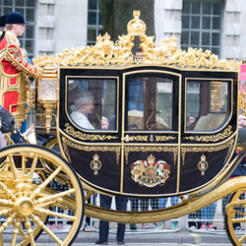Today’s Queen’s Speech includes a Housing Bill which will force some charities to dispose of assets at below market value – a move NCVO has described as a “worrying precedent” for the sector.
The Queen's Speech contains a programme of the legislation the government expects to bring in the next year.
Today's speech also contained a bill to introduce added powers for the Charity Commission, and to make it explicit that foundations can carry out social investment.
Housing Bill
The Housing Bill, which gives tenants of housing associations the right to buy their homes at a discount, would force housing associations to dispose of assets at below market value.
Housing associations are mostly a type of exempt charity called community benefit societies, but some are registered charities.
While it would not directly affect most of the voluntary sector, it indicates a willingness to direct charities how to use their assets.
“The extension would generate a worrying precedent of government interference in the running of independent charities by enabling the compulsory sale of charity assets at a discount,” wrote Elizabeth Chamberlain, policy manager at NCVO, in a blog on the Queen’s Speech.
“Current charity rules don’t allow charities to dispose of assets for less than their full value or other than in pursuit of charitable objectives to ensure that they are used for charitable, rather than political or private benefit.”
The National Housing Federation, the umbrella body for housing associations, has previously vowed to fight the proposals “every step of the way”.
“Housing associations are just as independent from government as Cancer Research UK and Oxfam, and the government has no more right to compel them to sell their property,” said David Orr, the federation’s chief executive.
“It would be a fundamental rewriting of the agreement between government and civil society.”
Charities (Protection and Social Investment Bill)
The Charities (Protection and Social Investment Bill), also included in the speech, is an updated version of the Protection of Charities Bill mentioned in the last Queen’s Speech. This contains a number of new powers for the Charity Commission, including the right to prevent a trustee involved in wrongdoing from taking up a role at another charity, and the ability to give statutory warnings.
It also includes a power to enable the Commission to direct a charity to close following an investigation, and a pre-emptive power to stop a charity breaching the law.
It also gives trustees an explicit power to make social investments, as recommended recently by the Law Commission.
William Shawcross, chair of the Commission, said: “I am very pleased that the Charities Bill has been included in the Queen’s Speech. This is a vital piece of legislation if we are to have the powers that we need to stop individuals abusing charities. We must be able to take action where abuse occurs. The public, who give so generously of their time and money, would expect nothing less.
“This bill is also good news for charities wanting to make social investments. I recommend this Bill to parliamentarians.”
The bill has already been through consultation and scrutiny by a joint Parliamentary committee.
Chamberlain said NCVO welcomed the bill but felt the new powers were unlikely to be used more than a handful of times each year.
Other measures in the speech
The speech contained proposals for a Bill of Rights, rather than a firm commitment to use it to replace the Human Rights Act. The Conservatives have vowed to scrap the Human Rights Act, but many charities have fought to preserve it.
The speech includes a commitment not to raise VAT during this Parliament. A previous decision to increase the rate of VAT from 17.5 per cent to 20 per cent is estimated by the Charity Tax Group to have cost the sector around £150m.








